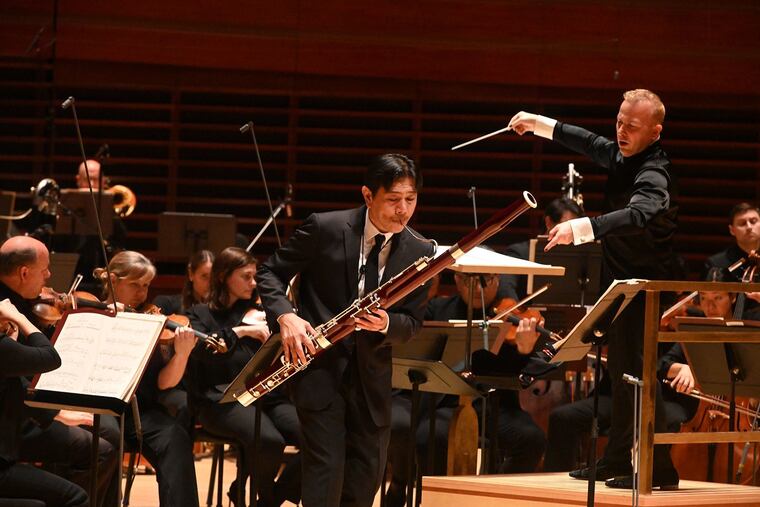Philadelphia Orchestra voices support for the people of Israel and Gaza, offers musical balms
Matías Tarnopolsky recalled the orchestra's 2018 Israel tour, and how it brought together "Jews and Arabs in musical harmony without borders."

A moving speech. Music that felt cleansing and cathartic. A composer who, at least for this listener, is unmatched for his ability to change the chemistry of the brain.
It’s been a grim, unsettling week, filled with the kind of news that has tested our sense of humanity, and it’s impossible to know now how the particular pieces of Thursday night’s Philadelphia Orchestra concert might have hit in another time.
But the orchestra has an uncanny way of planning programs months in advance that, by the time they reach the stage, somehow speak to larger events. Even without the speeches before the downbeat in Verizon Hall, the concert’s three works held up a mirror to the moment.
In two brief addresses to the audience, orchestra music and artistic director Yannick Nézet-Séguin and orchestra-Kimmel chief Matías Tarnopolsky created a context that was crystal clear.
“We are heartbroken at the brutal terrorist attacks against Israel and the ensuing loss of innocent lives in Israel and in Gaza. We express our sincere condolences to the members of our musical family, staff, community, and the victims who have been affected by these horrific acts,” said Tarnopolsky, standing on stage alongside the conductor.
He went on to talk about the orchestra’s own connection — a 2018 tour of Israel when it formed “powerful bonds” with audiences. “We stand today with the people of Israel,” he said.
In one of the most meaningful moments of that tour, Tarnopolsky continued, “Yannick and musicians from the Philadelphia Orchestra led a performance at the Oasis of Peace, bringing together Jews and Arabs in musical harmony without borders.”
Nézet-Séguin then spoke about how “these recent tragic events can elicit an array of deeply personal emotions — sadness, anger, loneliness, whatever you might be feeling at this moment,” and that he hoped the music would “provide a space for reflection, comfort, or connection with those around you tonight and everywhere in the world.”
The orchestra has often stepped up to react to events well beyond the concert hall. It was founded in 1900 after musicians organized concerts benefiting families of those killed in the Spanish-American War. It has regularly held relief concerts for various causes, and provided Philadelphia with balm just days after 9 / 11 in a Mann Center concert led by Wolfgang Sawallisch.
What was surprising about Thursday’s concert was that the repertoire dovetailed (again, unwittingly) with the emotion of the moment, and was perhaps even transformed by it. Directly after the speeches, Nézet-Séguin led Luciano Berio’s Four Original Versions of Luigi Boccherini’s The Night Retreat of Madrid, which arrived like joy coming over the horizon. The piece, a series of variations on a noble but gentle tune (in various versions), plays out like a parade first heard dimly in the distance. It passes before you and then moves on.
There are moments of levity, like the Rossini-esque solos so elegantly realized by oboist Philippe Tondre, and little glints of dissonance. But thanks to the expansive view of Nézet-Séguin, it was that middle section that really swelled with emotion. Loud and proud, it was a climax of nearly unbearable bliss.
The great accomplishment of Terra, the bassoon concerto by Brazilian American composer Clarice Assad receiving its world premiere, was its ability to move across numerous stylistic borders to create a world unto itself. Played with soul and virtuosity by bassoon soloist Daniel Matsukawa, the piece was easy on the ears and packed with some gripping emotional storylines. You also had to admire the delicate, sensitive textures Assad used to ensure that the solo bassoon wasn’t a lone voice swallowed up by the crowd.
If there was an emotional Rorschach test in the program it was Rachmaninoff’s Symphony No. 1, which encompasses a universe of ideas. The brass in the last movement sounded particularly martial at a moment like this, but, for the most part, the piece is the kind of dreamy escape to a deeper, more free-associating part of the brain many look for — and find — in the concert hall.
The orchestra’s program is repeated Saturday at 8 p.m. in Verizon Hall, Broad and Spruce Streets, but with Rachmaninoff’s “Symphony No. 2″ instead of No. 1. Tickets are $10-$181. philorch.org, 215-893-1999